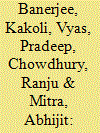| Srl | Item |
| 1 |
ID:
103785


|
|
|
| 2 |
ID:
106876


|
|
|
|
|
| Publication |
2011.
|
| Summary/Abstract |
According to the existing studies on Myanmar's economic history, agricultural land in the Lower Myanmar delta was transferred from 'agriculturists' to 'non-agriculturists' under British colonial rule. However, a clear distinction could not be drawn between the agriculturists and non-agriculturists as was generally thought with respect to their economic activity. More importantly, the categories could be applied interchangeably. The purpose of this study is to reconsider the very concept of 'agriculturist' as a colonial category in British Burma by exploring the hitherto unused register of holdings (Register IA, U pain hmatpoun sayin).
|
|
|
|
|
|
|
|
|
|
|
|
|
|
|
|
| 3 |
ID:
155756


|
|
|
|
|
| Summary/Abstract |
Disasters caused by cyclones are a cyclical event in the Bay of Bengal delta seaboard. Periodically, cyclone disasters result in damaged houses and the loss of crops and livelihoods. They affect every type of social and economic infrastructure in the delta, which is inhabited by ostracized backward caste groups – seafarers, forest goers and landless peasants. The 1970 Bhola cyclone, for example, was the most catastrophic, generating a 9.1-meter storm surge at the mouth of the Ganges where it meets the Bay killing approximately 300,000 people. Often, these disasters are declared as ‘natural’ and ‘acts of God.’ This paper tests this epistemic viewpoint. I argue that cyclone-related disasters, like other calamities, cannot be merely viewed as ‘natural’ phenomena. Instead their embeddedness in the social and political relations shaping human habitation on the coastal seaboard endangers human settlement and has made the inhabitants vulnerable since the colonial land reclamation program began in the late eighteenth and early nineteenth century in Bengal. Through examination of competing discourses around ‘natural disasters’, I demonstrate how cyclones are portrayed as natural (rather than human-induced). The naturalization of disaster benefits powerful actors like politicians, civil engineers and contactors, among others. In analyzing the disaster narrative, I go beyond the textual and rhetorical components to include the socio-political and historical bases of the production of ideas of disaster in the Bengal delta. By focusing on the political and social causes of disaster, this paper does not in any way question the ontological reality of cyclones ‘as dangerous and potentially very destructive natural hazards’; instead, it tries to demonstrate how disaster is naturalized in the different strands of state and epistemic discourse.
|
|
|
|
|
|
|
|
|
|
|
|
|
|
|
|